《中华人民共和国政府和新加坡共和国政府关于对所得避免双重征税和防止偷漏税的协定》及议定书条文解释
- 格式:docx
- 大小:51.11 KB
- 文档页数:25

中新税收协定解释国家税务总局关于印发《〈中华人民共和国政府和新加坡共和国政府关于对所得避免双重征税和防止偷漏税的协定〉及议定书条文解释》的通知国税发[2010]75号 2010-07-26各省、自治区、直辖市和计划单列市国家税务局、地方税务局:2007年7月11日,中国与新加坡签署了新的政府间对所得避免双重征税和防止偷漏税的协定及其议定书,2009年8月24日,双方签署了该协定的第二议定书。
该协定及其议定书以及第二议定书(以下统称“中新协定”)已分别于2008年1月1日与2009年12月11日起执行。
根据中新协定、《维也纳条约法公约》、《中华人民共和国企业所得税法》及其实施条例、《中华人民共和国个人所得税法》及其实施条例,国家税务总局制定了《中华人民共和国政府和新加坡共和国政府关于对所得避免双重征税和防止偷漏税的协定》及议定书条文解释(以下简称中新协定条文解释),现印发给你们,请遵照执行。
在执行中新协定条文解释规定时,应注意:一、我国对外所签协定有关条款规定与中新协定条款规定内容一致的,中新协定条文解释规定同样适用于其他协定相同条款的解释及执行;二、中新协定条文解释与此前下发的有关税收协定解释与执行文件不同的,以中新协定条文解释为准;三、各地税务机关要组织有关干部认真学习中新协定条文解释,并在此基础上正确理解与执行税收协定;四、对执行中存在的问题请及时层报税务总局(国际税务司)。
《中华人民共和国政府和新加坡共和国政府关于对所得避免双重征税和防止偷漏税的协定》及议定书条文解释第一条人的范围第一条确定协定适用的范围为“缔约国一方或同时为双方居民的人”。
本规定有三层含义。
第一,协定适用于“人”;第二,这些人必须是居民;第三,这些身为居民的人必须属于缔约国一方或双方。
其中“人”和“居民”的具体含义分别见下文对第三条和第四条的解释。
一般来说,除具体条款另有约定外,协定不适用于任何第三方居民。
第二条税种范围一、第一款规定协定适用的税种应符合以下条件:(一)必须是对所得征收的税收。
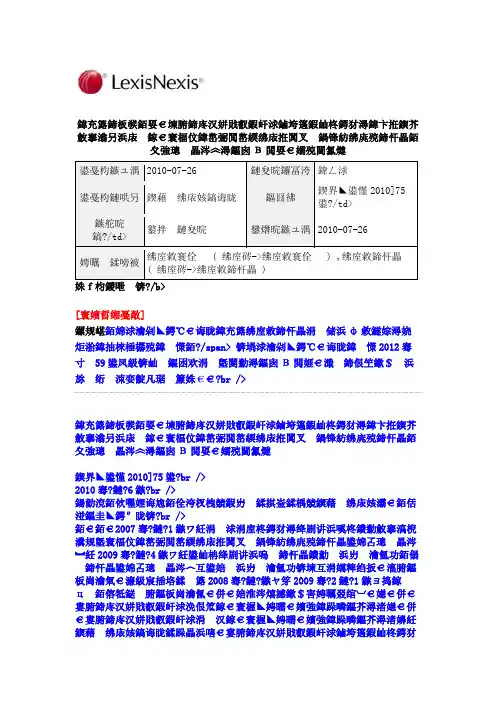
关于印发《〈中华人民共和国政府和新加坡共和国政府关于对所得避免双重征税和防止偷漏税的协定〉及议定书条文解释》的通知发文日期2010-07-26 有效范围全国发文机关国家税务总局文号国税发[2010]75号时效性现行有效生效日期2010-07-26法学分类税收征管 ( 税法->税收征管 ) ,税收协定 ( 税法->税收协定 )[律商网注]根据《国家税务总局关于税收协定中财产收益条款有关问题的公告》(国家税务总局公告2012年第59号),此文件中所附条文解释”第十三条第五款第四段已被废止。
关于印发《〈中华人民共和国政府和新加坡共和国政府关于对所得避免双重征税和防止偷漏税的协定〉及议定书条文解释》的通知国税发[2010]75号2010年7月26日各省、自治区、直辖市和计划单列市国家税务局、地方税务局:2007年7月11日,中国与新加坡签署了新的政府间对所得避免双重征税和防止偷漏税的协定及其议定书,2009年8月24日,双方签署了该协定的第二议定书。
该协定及其议定书以及第二议定书(以下统称“中新协定”)已分别于2008年1月1日与2009年12月11日起执行。
根据中新协定、《维也纳条约法公约》、《中华人民共和国企业所得税法》及其实施条例、《中华人民共和国个人所得税法》及其实施条例,国家税务总局制定了《中华人民共和国政府和新加坡共和国政府关于对所得避免双重征税和防止偷漏税的协定》及议定书条文解释(以下简称中新协定条文解释),现印发给你们,请遵照执行。
在执行中新协定条文解释规定时,应注意:一、我国对外所签协定有关条款规定与中新协定条款规定内容一致的,中新协定条文解释规定同样适用于其他协定相同条款的解释及执行;二、中新协定条文解释与此前下发的有关税收协定解释与执行文件不同的,以中新协定条文解释为准;三、各地税务机关要组织有关干部认真学习中新协定条文解释,并在此基础上正确理解与执行税收协定;四、对执行中存在的问题请及时层报税务总局(国际税务司)。

乐税智库文档财税法规策划 乐税网国家税务总局关于我国和新加坡避免双重征税协定有关条文解释和执行问题的通知【标 签】避免双重征税,防止偷漏税避免双重征税,防止偷漏税,新加坡【颁布单位】国家税务总局【文 号】国税函﹝2007﹞1212号【发文日期】2007-12-06【实施时间】2007-09-18【 有效性 】全文有效【税 种】税收协定各省、自治区、直辖市和计划单列市国家税务局、地方税务局: 《中华人民共和国政府和新加坡共和国政府关于对所得避免双重征税和防止偷漏税的协定》(以下简称《协定》)于2007年7月11日正式签署,并自2007年9月18日起生效,适用于2008年1月1日起发生的所得。
《协定》是对中新两国政府原避免双重征税协定的全面修订,原协定及议定书自本《协定》生效之日起停止有效。
为做好《协定》的执行工作,现就《协定》有关条文解释等问题明确如下: 一、关于《协定》的执行时间 (一)《协定》自2008年1月1日起执行。
适用于纳税人2008年1月1日以后取得的所得。
(二)在对居民个人执行《协定》规定按停留时间判定纳税义务时应自2008年1月1日起开始计算;对居民企业执行《协定》规定按项目或活动时间判定纳税义务时,由于新协定和原协定判定时间的标准一致,对2008年1月1日以前开始的工程项目或活动时间的计算不予中断,应连续计算。
二、关于第四条居民 第四条第一款对“缔约国一方”居民的判定标准中所列的“法定机构”一语是应新方的要求根据其国内法的规定列入的,指依照新议会法案设立,并执行政府职能的机构,如“新加坡经济发展局”和“新加坡旅游局”等机构。
三、关于第八条海运和空运 (一)关于所得税 双方企业以船舶或飞机从事国际运输业务从对方取得的利润在对方国家免征所得税。
从事国际运输业务取得的利润除企业常规的客运或货运收入外,还包括以下项目: 1.企业从附属于有关国际运输业务的存款中取得的利息收入,具体指将有关客运或货运收入临时存入银行产生的存款利息收入; 2.企业在从事国际运输业务活动中附带发生的船舶或飞机租赁所得(包括光租)以及集装箱的使用、租赁所得。
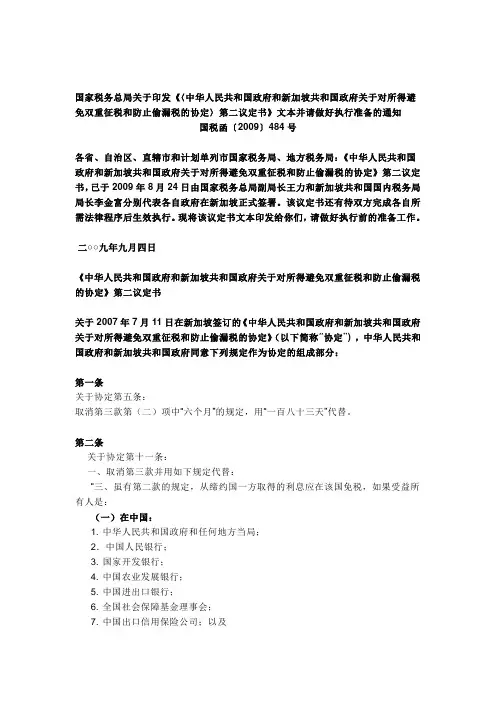
国家税务总局关于印发《〈中华人民共和国政府和新加坡共和国政府关于对所得避免双重征税和防止偷漏税的协定〉第二议定书》文本并请做好执行准备的通知国税函〔2009〕484号各省、自治区、直辖市和计划单列市国家税务局、地方税务局:《中华人民共和国政府和新加坡共和国政府关于对所得避免双重征税和防止偷漏税的协定》第二议定书,已于2009年8月24日由国家税务总局副局长王力和新加坡共和国国内税务局局长李金富分别代表各自政府在新加坡正式签署。
该议定书还有待双方完成各自所需法律程序后生效执行。
现将该议定书文本印发给你们,请做好执行前的准备工作。
二○○九年九月四日《中华人民共和国政府和新加坡共和国政府关于对所得避免双重征税和防止偷漏税的协定》第二议定书关于2007年7月11日在新加坡签订的《中华人民共和国政府和新加坡共和国政府关于对所得避免双重征税和防止偷漏税的协定》(以下简称“协定”),中华人民共和国政府和新加坡共和国政府同意下列规定作为协定的组成部分:第一条关于协定第五条:取消第三款第(二)项中“六个月”的规定,用“一百八十三天”代替。
第二条关于协定第十一条:一、取消第三款并用如下规定代替:“三、虽有第二款的规定,从缔约国一方取得的利息应在该国免税,如果受益所有人是:(一)在中国:1.中华人民共和国政府和任何地方当局;2.中国人民银行;3.国家开发银行;4.中国农业发展银行;5.中国进出口银行;6.全国社会保障基金理事会;7.中国出口信用保险公司;以及8.缔约国双方主管当局随时可同意的,由中国政府完全拥有的任何机构;第三款第(一)项2-7目所列实体或基金应为中国政府完全拥有并且不从事商业活动。
(二)在新加坡:1.新加坡共和国政府;2.新加坡金融管理局;3.新加坡政府投资有限公司;4.法定机构;以及5.缔约国双方主管当局随时可同意的,由新加坡政府完全拥有的任何机构; 第三款第(二)项2-4目所列实体应依照新加坡议会法案规定设立或完全由新加坡政府拥有,并且不从事商业活动。
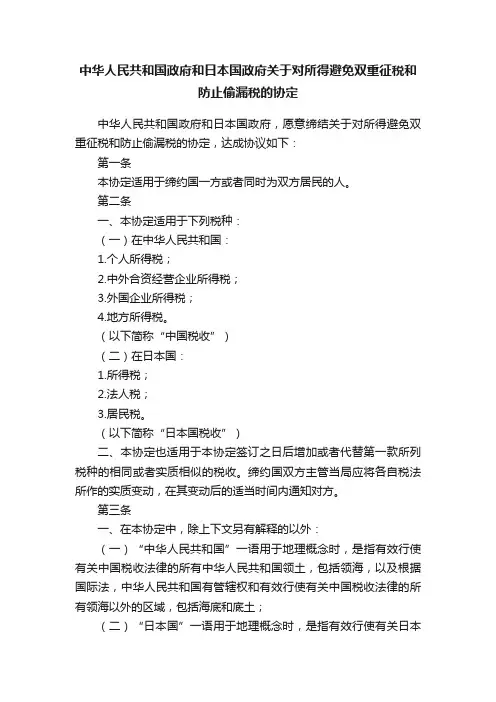
中华人民共和国政府和日本国政府关于对所得避免双重征税和防止偷漏税的协定中华人民共和国政府和日本国政府,愿意缔结关于对所得避免双重征税和防止偷漏税的协定,达成协议如下:第一条本协定适用于缔约国一方或者同时为双方居民的人。
第二条一、本协定适用于下列税种:(一)在中华人民共和国:1.个人所得税;2.中外合资经营企业所得税;3.外国企业所得税;4.地方所得税。
(以下简称“中国税收”)(二)在日本国:1.所得税;2.法人税;3.居民税。
(以下简称“日本国税收”)二、本协定也适用于本协定签订之日后增加或者代替第一款所列税种的相同或者实质相似的税收。
缔约国双方主管当局应将各自税法所作的实质变动,在其变动后的适当时间内通知对方。
第三条一、在本协定中,除上下文另有解释的以外:(一)“中华人民共和国”一语用于地理概念时,是指有效行使有关中国税收法律的所有中华人民共和国领土,包括领海,以及根据国际法,中华人民共和国有管辖权和有效行使有关中国税收法律的所有领海以外的区域,包括海底和底土;(二)“日本国”一语用于地理概念时,是指有效行使有关日本国税收法律的所有日本国领土,包括领海,以及根据国际法,日本国有管辖权和有效行使有关日本国税收法律的所有领海以外的区域,包括海底和底土;(三)“缔约国一方”和“缔约国另一方”的用语,按照上下文,是指中华人民共和国或者日本国;(四)“税收”一语,按照上下文,是指中国税收或者日本国税收;(五)“人”一语包括个人、公司和其它团体;(六)“公司”一语是指法人团体或者在税收上视同法人团体的实体;(七)“缔约国一方企业”和“缔约国另一方企业”的用语,分别指缔约国一方居民经营的企业和缔约国另一方居民经营的企业;(八)“国民”一语是指所有具有缔约国任何一方国籍的个人和所有按照该缔约国法律建立或者组织的法人,以及所在在该缔约国税收上,视同按照该缔约国法律建立或者组织成法人的非法人团体;(九)“国际运输”一语是指缔约国一方企业以船舶或飞机经营的运输,不包括仅在缔约国另一方各地之间以船舶或飞机经营的运输;(十)“主管当局”一语,在中华人民共和国方面是指财政部或其授权的代表;在日本国方面是指大藏大臣或其授权的代表。
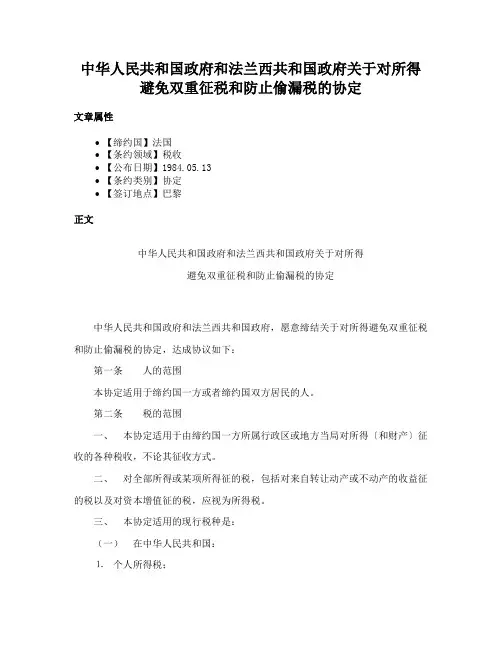
中华人民共和国政府和法兰西共和国政府关于对所得避免双重征税和防止偷漏税的协定文章属性•【缔约国】法国•【条约领域】税收•【公布日期】1984.05.13•【条约类别】协定•【签订地点】巴黎正文中华人民共和国政府和法兰西共和国政府关于对所得避免双重征税和防止偷漏税的协定中华人民共和国政府和法兰西共和国政府,愿意缔结关于对所得避免双重征税和防止偷漏税的协定,达成协议如下:第一条人的范围本协定适用于缔约国一方或者缔约国双方居民的人。
第二条税的范围一、本协定适用于由缔约国一方所属行政区或地方当局对所得〔和财产〕征收的各种税收,不论其征收方式。
二、对全部所得或某项所得征的税,包括对来自转让动产或不动产的收益征的税以及对资本增值征的税,应视为所得税。
三、本协定适用的现行税种是:(一)在中华人民共和国:⒈个人所得税;⒉中外合资经营企业所得税;⒊外国企业所的税;⒋地方所得税。
包括上述各种税的源泉扣和缴预扣款。
(以下称为“中国税收”)(二)在法兰西共和国:⒈所得税;⒉公司税;包括上述各种税的源泉扣缴和预扣款。
(以下称为“法国税收”)四、本协定也适用于本协定签订之日后增加或者代替第三款所列现行税种的相同或者实质相似的税收。
缔约国双方主管当局应将各自税法所作的实质变动,在其变动后的适当时间内通知对方。
第三条一般定义一、在本协定中,除上下文另有解释的以外:(一)“缔约国一方”和“缔约国另一方”的用语,按照上下文,是指中华人民共和国或者法兰西共和国;(二)“税收”一语,按照上下文,是指中国税收或者法国税收;(三)“人”一语包括自然人,公司和任何其它团体;(四)“公司”一语是指任何法人团体或者在税收上视同法人团体的实体;(五)“人”一语是指个人、公司和其它团体;(六)“国民”一语是指所有具有缔约国一方国籍的自然人和所有该缔约国法律建立或者组织的法人,以及在税收上,视同按照该缔约国法律建立或者组织成法人的任何非法人团体;(七)“主管当局”一语,在中华人民共和国方面是财政部或其授权的代表;在法兰西共和国方面是指负责预算的部长或其授权的代表。
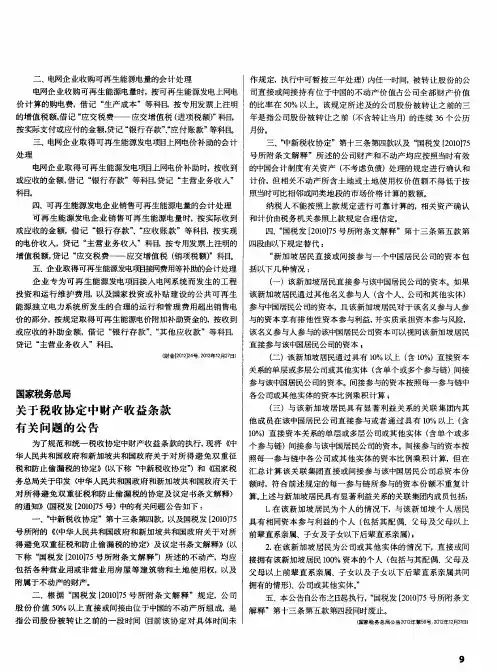
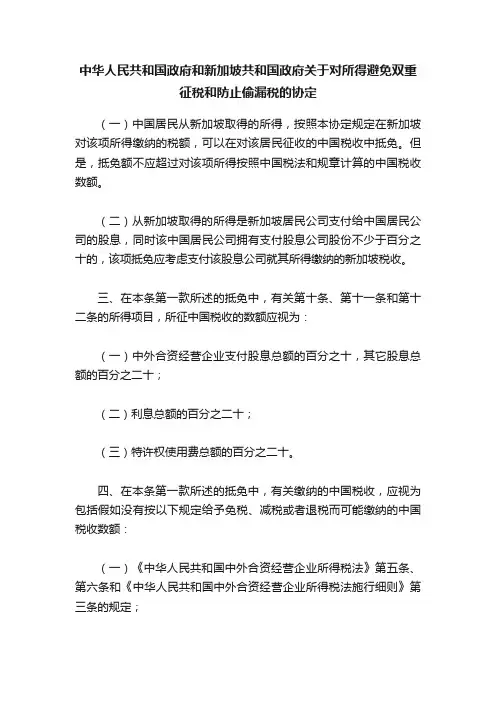
中华人民共和国政府和新加坡共和国政府关于对所得避免双重征税和防止偷漏税的协定(一)中国居民从新加坡取得的所得,按照本协定规定在新加坡对该项所得缴纳的税额,可以在对该居民征收的中国税收中抵免。
但是,抵免额不应超过对该项所得按照中国税法和规章计算的中国税收数额。
(二)从新加坡取得的所得是新加坡居民公司支付给中国居民公司的股息,同时该中国居民公司拥有支付股息公司股份不少于百分之十的,该项抵免应考虑支付该股息公司就其所得缴纳的新加坡税收。
三、在本条第一款所述的抵免中,有关第十条、第十一条和第十二条的所得项目,所征中国税收的数额应视为:(一)中外合资经营企业支付股息总额的百分之十,其它股息总额的百分之二十;(二)利息总额的百分之二十;(三)特许权使用费总额的百分之二十。
四、在本条第一款所述的抵免中,有关缴纳的中国税收,应视为包括假如没有按以下规定给予免税、减税或者退税而可能缴纳的中国税收数额:(一)《中华人民共和国中外合资经营企业所得税法》第五条、第六条和《中华人民共和国中外合资经营企业所得税法施行细则》第三条的规定;(二)《中华人民共和国外国企业所得税法》第四条和第五条的规定;(三)《中华人民共和国国务院关于经济特区和沿海十四个港口城市减征、免征企业所得税和工商统一税的暂行规定》中,有关减征、免征所得税的第一条第一款、第二款、第三款,第二条第一款、第二款、第三款和第三条第一款、第二款的规定;(四)本协定签订之日或以后,中国为促进经济发展,在有关法律中作出的任何减税、免税或者退税的规定,经缔约国双方主管当局同意的。
第二十五条无差别待遇一、缔约国一方国民在缔约国另一方负担的税收或者有关条件,不应与该缔约国另一方国民在相同情况下,负担或可能负担的税收或者有关条件不同或比其更重。
二、缔约国一方企业在缔约国另一方的常设机构税收负担,不应高于该缔约国另一方。
三、本条不应理解为:(一)缔约国一方给予该缔约国居民的任何个人扣除、优惠和减免也必须给予该缔约国另一方居民;或者(二)缔约国一方给予不是该缔约国一方居民的国民或在该缔约国一方税法中指定的其他人的个人扣除、优惠和减税也必须给予缔约国另一方的国民。
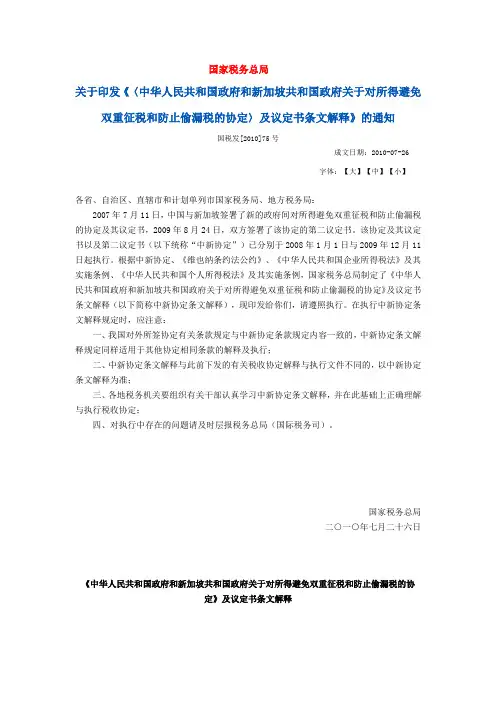
国家税务总局关于印发《〈中华人民共和国政府和新加坡共和国政府关于对所得避免双重征税和防止偷漏税的协定〉及议定书条文解释》的通知国税发[2010]75号成文日期:2010-07-26字体:【大】【中】【小】各省、自治区、直辖市和计划单列市国家税务局、地方税务局:2007年7月11日,中国与新加坡签署了新的政府间对所得避免双重征税和防止偷漏税的协定及其议定书,2009年8月24日,双方签署了该协定的第二议定书。
该协定及其议定书以及第二议定书(以下统称“中新协定”)已分别于2008年1月1日与2009年12月11日起执行。
根据中新协定、《维也纳条约法公约》、《中华人民共和国企业所得税法》及其实施条例、《中华人民共和国个人所得税法》及其实施条例,国家税务总局制定了《中华人民共和国政府和新加坡共和国政府关于对所得避免双重征税和防止偷漏税的协定》及议定书条文解释(以下简称中新协定条文解释),现印发给你们,请遵照执行。
在执行中新协定条文解释规定时,应注意:一、我国对外所签协定有关条款规定与中新协定条款规定内容一致的,中新协定条文解释规定同样适用于其他协定相同条款的解释及执行;二、中新协定条文解释与此前下发的有关税收协定解释与执行文件不同的,以中新协定条文解释为准;三、各地税务机关要组织有关干部认真学习中新协定条文解释,并在此基础上正确理解与执行税收协定;四、对执行中存在的问题请及时层报税务总局(国际税务司)。
国家税务总局二○一○年七月二十六日《中华人民共和国政府和新加坡共和国政府关于对所得避免双重征税和防止偷漏税的协定》及议定书条文解释第一条人的范围第一条确定协定适用的范围为“缔约国一方或同时为双方居民的人”。
本规定有三层含义。
第一,协定适用于“人”;第二,这些人必须是居民;第三,这些身为居民的人必须属于缔约国一方或双方。
其中“人”和“居民”的具体含义分别见下文对第三条和第四条的解释。
一般来说,除具体条款另有约定外,协定不适用于任何第三方居民。
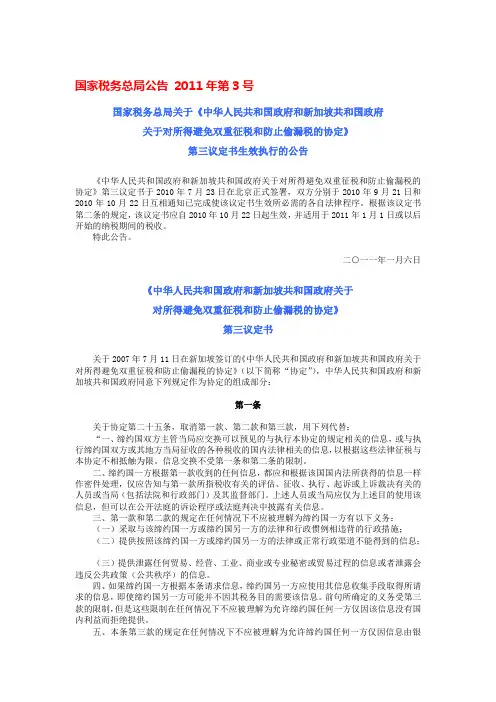
国家税务总局公告2011年第3号国家税务总局关于《中华人民共和国政府和新加坡共和国政府关于对所得避免双重征税和防止偷漏税的协定》第三议定书生效执行的公告《中华人民共和国政府和新加坡共和国政府关于对所得避免双重征税和防止偷漏税的协定》第三议定书于2010年7月23日在北京正式签署,双方分别于2010年9月21日和2010年10月22日互相通知已完成使该议定书生效所必需的各自法律程序。
根据该议定书第二条的规定,该议定书应自2010年10月22日起生效,并适用于2011年1月1日或以后开始的纳税期间的特此公告。
二○一一年一月六日《中华人民共和国政府和新加坡共和国政府关于对所得避免双重征税和防止偷漏税的协定》第三议定书关于2007年7月11日在新加坡签订的《中华人民共和国政府和新加坡共和国政府关于对所得避免双重征税和防止偷漏税的协定》(以下简称“协定”),中华人民共和国政府和新第一条“一、缔约国双方主管当局应交换可以预见的与执行本协定的规定相关的信息,或与执行缔约国双方或其地方当局征收的各种税收的国内法律相关的信息,以根据这些法律征税与二、缔约国一方根据第一款收到的任何信息,都应和根据该国国内法所获得的信息一样作密件处理,仅应告知与第一款所指税收有关的评估、征收、执行、起诉或上诉裁决有关的人员或当局(包括法院和行政部门)及其监督部门。
上述人员或当局应仅为上述目的使用该三、第一款和第二款的规定在任何情况下不应被理解为缔约国一方有以下义务(二)提供按照该缔约国一方或缔约国另一方的法律或正常行政渠道不能得到的信息;(三)提供泄露任何贸易、经营、工业、商业或专业秘密或贸易过程的信息或者泄露会违反公共政策(公共秩序)的信息。
四、如果缔约国一方根据本条请求信息,缔约国另一方应使用其信息收集手段取得所请求的信息,即使缔约国另一方可能并不因其税务目的需要该信息。
前句所确定的义务受第三款的限制,但是这些限制在任何情况下不应被理解为允许缔约国任何一方仅因该信息没有国内利五、本条第三款的规定在任何情况下不应被理解为允许缔约国任何一方仅因信息由银行、其他金融机构、名义代表人、代理人或受托人所持有,或因信息与人的所有权益有关,而拒绝提供。
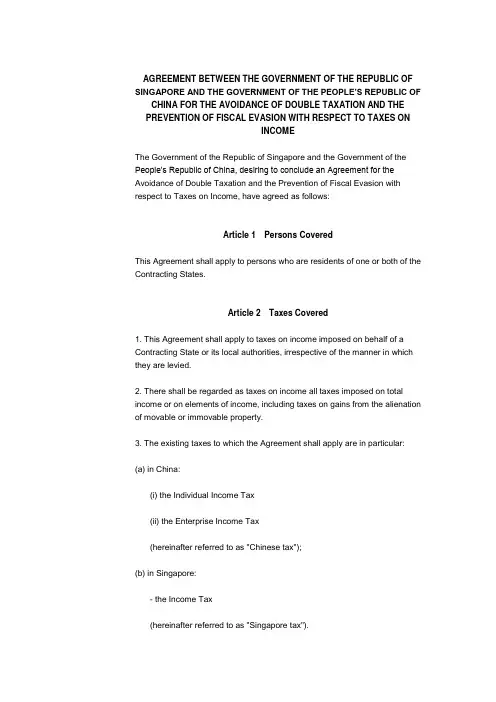
AGREEMENT BETWEEN THE GOVERNMENT OF THE REPUBLIC OF SINGAPORE AND THE GOVERNMENT OF THE PEOPLE’S REPUBLIC OF CHINA FOR THE AVOIDANCE OF DOUBLE TAXATION AND THE PREVENTION OF FISCAL EVASION WITH RESPECT TO TAXES ONINCOMEThe Government of the Republic of Singapore and the Government of the People’s Republic of China, desiring to conclude an Agreement for the Avoidance of Double Taxation and the Prevention of Fiscal Evasion with respect to Taxes on Income, have agreed as follows:Article 1Persons CoveredThis Agreement shall apply to persons who are residents of one or both of the Contracting States.Article 2Taxes Covered1. This Agreement shall apply to taxes on income imposed on behalf of a Contracting State or its local authorities, irrespective of the manner in which they are levied.2. There shall be regarded as taxes on income all taxes imposed on total income or on elements of income, including taxes on gains from the alienation of movable or immovable property.3. The existing taxes to which the Agreement shall apply are in particular:(a) in China:(i) the Individual Income Tax(ii) the Enterprise Income Tax(hereinafter referred to as "Chinese tax");(b) in Singapore:- the Income Tax(hereinafter referred to as "Singapore tax").4. The Agreement shall apply also to any identical or substantially similar taxes which are imposed after the date of signature of the Agreement in addition to, or in place of, the existing taxes. The competent authorities of the Contracting States shall notify each other of any significant changes which have been made in their respective taxation laws.Article 3General Definitions1. For the purposes of this Agreement, unless the context otherwise requires:(a) the term "China" means the People’s Republic of China, and when used in geographical sense, means all the territory of the People’s Republic of China, including its territorial sea, in which the Chinese laws relating to taxation apply, and any area beyond its territorial sea, within which the People’s Republic of China has sovereign rights of exploration for and exploitation of resources of the sea-bed and its sub-soil and superjacent water resources in accordance with international law;(b) the term "Singapore" means the Republic of Singapore and when used in a geographical sense, the term "Singapore" includes the territorial waters of Singapore and any area extending beyond the limits of the territorial waters of Singapore, and the sea-bed and subsoil of any such area, which has been or may hereafter be designated under the laws of Singapore and in accordance with international law as an area over which Singapore has sovereign rights for the purposes of exploring and exploiting the natural resources, whether living or non-living;(c) the terms "a Contracting State" and "the other Contracting State" mean China or Singapore as the context requires;(d) the term "person" includes an individual, a company and any other body of persons;(e) the term "company" means any body corporate or any entity that is treated as a body corporate for tax purposes;(f) the terms "enterprise of a Contracting State" and "enterprise of the other Contracting State" mean respectively an enterprise carried on by a resident of a Contracting State and an enterprise carried on by a resident of the other Contracting State;(g) the term "international traffic" means any transport by a ship or aircraft operated by an enterprise of a Contracting State, except when the ship or aircraft is operated solely between places in the other Contracting State;(h) the term "competent authority" means:(i) in the case of China, the State Administration of Taxation or itsauthorised representative; and(ii) in the case of Singapore, the Minister for Finance or his authorisedrepresentative;(i) the term "national" means:(i) any individual possessing the nationality of a Contracting State;(ii) any legal person, partnership or association deriving its status as such from the laws in force in a Contracting State.2. As regards the application of the Agreement at any time by a Contracting State, any term not defined therein shall, unless the context otherwise requires, have the meaning that it has at that time under the law of that State for the purposes of the taxes to which the Agreement applies, any meaning under the applicable tax laws of that State prevailing over a meaning given to the term under other laws of that State.Article 4Resident1. For the purposes of this Agreement, the term "resident of a Contracting State" means any person who, under the laws of that State, is liable to tax therein by reason of his domicile, residence, place of management, place of head office, place of incorporation or any other criterion of a similar nature, and also includes that State, a local authority or statutory body thereof.2. Where by reason of the provisions of paragraph 1 an individual is a resident of both Contracting States, then his status shall be determined as follows:(a) he shall be deemed to be a resident only of the State in which he has a permanent home available to him; if he has a permanent home available to him in both States, he shall be deemed to be a resident of the State with which his personal and economic relations are closer (centre of vital interests);(b) if the State in which he has his centre of vital interests cannot be determined, or if he has not a permanent home available to him in either State, he shall be deemed to be a resident only of the State in which he has an habitual abode;(c) if he has an habitual abode in both States or in neither of them, he shall be deemed to be a resident only of the State of which he is a national;(d) in any other case, the competent authorities of the Contracting States shall settle the question by mutual agreement.3. Where by reason of the provisions of paragraph 1 a person other than an individual is a resident of both Contracting States, then it shall be deemed to be a resident only of the State in which its place of effective management is situated. If its place of effective management cannot be determined, the competent authorities of the Contracting States shall settle the question by mutual agreement.Article 5Permanent Establishment1. For the purposes of this Agreement, the term "permanent establishment" means a fixed place of business through which the business of an enterprise is wholly or partly carried on.2. The term "permanent establishment" includes especially:(a) a place of management;(b) a branch;(c) an office;(d) a factory;(e) a workshop; and(f) a mine, an oil or gas well, a quarry or any other place of extraction of natural resources.3. The term "permanent establishment" likewise encompasses:(a) a building site, a construction, assembly or installation project or supervisory activities in connection therewith, but only where such site, project or activities continue for a period of more than 6 months;(b) the furnishing of services, including consultancy services, by an enterprise through employees or other personnel engaged by the enterprise for such purpose, but only if such activities of that nature continue (for the same or a connected project) within a Contracting State for a period or periods aggregating more than 6 months within any twelve-month period.4. Notwithstanding the preceding provisions of this Article, the term "permanent establishment" shall be deemed not to include:(a) the use of facilities solely for the purpose of storage, display or delivery of goods or merchandise belonging to the enterprise;(b) the maintenance of a stock of goods or merchandise belonging to the enterprise solely for the purpose of storage, display or delivery;(c) the maintenance of a stock of goods or merchandise belonging to the enterprise solely for the purpose of processing by another enterprise;(d) the maintenance of a fixed place of business solely for the purpose of purchasing goods or merchandise or of collecting information, for the enterprise;(e) the maintenance of a fixed place of business solely for the purpose of carrying on, for the enterprise, any other activity of a preparatory or auxiliary character;(f) the maintenance of a fixed place of business solely for any combination of activities mentioned in sub-paragraphs (a) to (e), provided that the overall activity of the fixed place of business resulting from this combination is of a preparatory or auxiliary character.5. Notwithstanding the provisions of paragraphs 1 and 2, where a person - other than an agent of an independent status to whom paragraph 6 applies - is acting in a Contracting State on behalf of an enterprise of the other Contracting State, has and habitually exercises an authority to conclude contracts in the name of the enterprise, that enterprise shall be deemed to have a permanent establishment in the first-mentioned Contracting State in respect of any activities which that person undertakes for the enterprise, unless the activities of such person are limited to those mentioned in paragraph 4 which, if exercised through a fixed place of business, would not make this fixed place of business a permanent establishment under the provisions of that paragraph.6. An enterprise of a Contracting State shall not be deemed to have a permanent establishment in the other Contracting State merely because it carries on business in that other State through a broker, general commission agent or any other agent of an independent status, provided that such persons are acting in the ordinary course of their business. However, when the activities of such an agent are devoted wholly or almost wholly on behalf of that enterprise, and conditions are made or imposed between that enterprise and the agent in their commercial and financial relations which differ from those which would have been made between independent enterprises, he will not be considered an agent of an independent status within the meaning of this paragraph.7. The fact that a company which is a resident of a Contracting State controls or is controlled by a company which is a resident of the other Contracting State, or which carries on business in that other State (whether through a permanent establishment or otherwise), shall not of itself constitute either company a permanent establishment of the other.Article 6Income From Immovable Property1. Income derived by a resident of a Contracting State from immovable property (including income from agriculture or forestry) situated in the other Contracting State may be taxed in that other State.2. The term "immovable property" shall have the meaning which it has under the law of the Contracting State in which the property in question is situated. The term shall in any case include property accessory to immovable property, livestock and equipment used in agriculture and forestry, rights to which the provisions of general law respecting landed property apply, usufruct of immovable property and rights to variable or fixed payments as consideration for the working of, or the right to work, mineral deposits, sources and other natural resources; ships and aircraft shall not be regarded as immovable property.3. The provisions of paragraph 1 shall apply to income derived from the direct use, letting, or use in any other form of immovable property.4. The provisions of paragraphs 1 and 3 shall also apply to the income from immovable property of an enterprise and to income from immovable property used for the performance of independent personal services.Article 7Business Profits1. The profits of an enterprise of a Contracting State shall be taxable only in that State unless the enterprise carries on business in the other Contracting State through a permanent establishment situated therein. If the enterprise carries on business as aforesaid, the profits of the enterprise may be taxed in the other State but only so much of them as is attributable to that permanent establishment.2. Subject to the provisions of paragraph 3, where an enterprise of a Contracting State carries on business in the other Contracting State through a permanent establishment situated therein, there shall in each Contracting State be attributed to that permanent establishment the profits which it might be expected to make if it were a distinct and separate enterprise engaged in the same or similar activities under the same or similar conditions and dealing wholly independently with the enterprise of which it is a permanent establishment.3. In determining the profits of a permanent establishment, there shall be allowed as deductions expenses which are incurred for the purposes of the permanent establishment, including executive and general administrative expenses so incurred, whether in the State in which the permanent establishment is situated or elsewhere.4. Insofar as it has been customary in a Contracting State to determine the profits to be attributed to a permanent establishment on the basis of an apportionment of the total profits of the enterprise to its various parts, nothing in paragraph 2 shall preclude that Contracting State from determining the profits to be taxed by such an apportionment as may be customary. The method of apportionment adopted shall, however, be such that the result shall be in accordance with the principle contained in this Article.5. No profits shall be attributed to a permanent establishment by reason of the mere purchase by that permanent establishment of goods or merchandise for the enterprise.6. For the purposes of the preceding paragraphs, the profits to be attributed to the permanent establishment shall be determined by the same method year by year unless there is good and sufficient reason to the contrary.7. Where profits include items of income which are dealt with separately in other Articles of this Agreement, then the provisions of those Articles shall not be affected by the provisions of this Article.Article 8Shipping and Air Transport1. Profits derived by an enterprise of a Contracting State from the operation of ships or aircraft in international traffic shall be taxable only in that State.2. The provisions of paragraph 1 shall also apply to profits from the participation in a pool, a joint business or an international operating agency.3. Interest derived by an enterprise of a Contracting State from its deposits of moneys incidental to and connected with its operations of ships or aircraft in international traffic shall be regarded as profits derived from the operation of such ships or aircraft.4. For the purposes of this Article, profits from the operation of ships or aircraft in international traffic shall include:(a) profits from the rental on a bareboat basis of ships or aircraft; and(b) profits from the use, maintenance or rental of containers (including trailers and related equipment for the transport of containers), used for the transport of goods or merchandise;where such rental or such use, maintenance or rental, as the case may be, is incidental to the operation of ships or aircraft in international traffic.Article 9Associated Enterprises1. Where(a) an enterprise of a Contracting State participates directly or indirectly in the management, control or capital of an enterprise of the other Contracting State, or(b) the same persons participate directly or indirectly in the management, control or capital of an enterprise of a Contracting State and an enterprise of the other Contracting State,and in either case conditions are made or imposed between the two enterprises in their commercial or financial relations which differ from those which would be made between independent enterprises, then any profits which would, but for those conditions, have accrued to one of the enterprises, but, by reason of those conditions, have not so accrued, may be included in the profits of that enterprise and taxed accordingly.2. Where a Contracting State includes in the profits of an enterprise of that State -- and taxes accordingly -- profits on which an enterprise of the other Contracting State has been charged to tax in that other State and the profits so included are profits which would have accrued to the enterprise of thefirst-mentioned State if the conditions made between the two enterprises had been those which would have been made between independent enterprises, then that other State shall make an appropriate adjustment to the amount of the tax charged therein on those profits. In determining such adjustment, due regard shall be had to the other provisions of this Agreement and the competent authorities of the Contracting States shall if necessary consult each other.Article 10Dividends1. Dividends paid by a company which is a resident of a Contracting State to a resident of the other Contracting State may be taxed in that other State.2. However, such dividends may also be taxed in the Contracting State of which the company paying the dividends is a resident and according to the laws of that State, but if the beneficial owner of the dividends is a resident of the other Contracting State, the tax so charged shall not exceed:(a) 5 per cent of the gross amount of the dividends if the beneficial owner is a company (other than a partnership) which holds directly at least 25 per cent of the capital of the company paying the dividends;(b) 10 per cent of the gross amount of the dividends in all other cases.The competent authorities of the Contracting States shall by mutual agreement settle the mode of application of these limitations.This paragraph shall not affect the taxation of the company in respect of the profits out of which the dividends are paid.3. The term "dividends" as used in this Article means income from shares or other rights, not being debt-claims, participating in profits, as well as income from other corporate rights which is subjected to the same taxation treatment as income from shares by the laws of the State of which the company making the distribution is a resident.4. The provisions of paragraphs 1 and 2 shall not apply if the beneficial owner of the dividends, being a resident of a Contracting State, carries on business in the other Contracting State of which the company paying the dividends is a resident, through a permanent establishment situated therein, or performs in that other State independent personal services from a fixed base situated therein, and the holding in respect of which the dividends are paid is effectively connected with such permanent establishment or fixed base. In such case the provisions of Article 7 or Article 14, as the case may be, shall apply.5. Where a company which is a resident of a Contracting State derives profits or income from the other Contracting State, that other State may not impose any tax on the dividends paid by the company, except insofar as such dividends are paid to a resident of that other State or insofar as the holding in respect of which the dividends are paid is effectively connected with a permanent establishment or a fixed base situated in that other State, nor subject the company's undistributed profits to a tax on undistributed profits, even if the dividends paid or the undistributed profits consist wholly or partly of profits or income arising in such other State.6. The provisions of this Article shall not apply if it was the main purpose of any person concerned with the creation or assignment of the shares or other rights in respect of which the dividend is paid to take advantage of this Article by means of that creation or assignment.Article 11Interest1. Interest arising in a Contracting State and paid to a resident of the other Contracting State may be taxed in that other State.2. However, such interest may also be taxed in the Contracting State in which it arises and according to the laws of that State, but if the beneficial owner of the interest is a resident of the other Contracting State, the tax so charged shall not exceed:(a) 7 per cent of the gross amount of the interest if it is received by any bank or financial institution;(b) 10 per cent of the gross amount of the interest in all other cases.The competent authorities of the Contracting States shall by mutual agreement settle the mode of application of this limitation.3. Notwithstanding the provisions of paragraph 2, interest derived from a Contracting State is exempt from tax in that State, if the beneficial owner is:(a) in the case of China:(i) the Government of the People’s Republic of China and any localauthority thereof;(ii) the China Development Bank;(iii) the Agricultural Development Bank of China;(iv) the Export-Import Bank of China;(v) the National Council for Social Security Fund;(vi) the China Export & Credit Insurance Corporation; and(vii) any institution wholly owned by the Government of China as may be agreed from time to time between the competent authorities of theContracting States.(b) in the case of Singapore:(i) the Government of the Republic of Singapore;(ii) the Monetary Authority of Singapore;(iii) the Government of Singapore Investment Corporation Pte Ltd;(iv) a statutory body; and(v) any institution wholly owned by the Government of Singapore as may be agreed from time to time between the competent authorities of theContracting States.4. The term "interest" as used in this Article means income from debt-claims of every kind, whether or not secured by mortgage and whether or not carrying a right to participate in the debtor's profits, and in particular, income from government securities and income from bonds or debentures, including premiums and prizes attaching to such securities, bonds or debentures. Penalty charges for late payment shall not be regarded as interest for the purpose of this Article.5. The provisions of paragraphs 1 and 2 shall not apply if the beneficial owner of the interest, being a resident of a Contracting State, carries on business in the other Contracting State in which the interest arises, through a permanent establishment situated therein, or performs in that other State independent personal services from a fixed base situated therein, and the debt-claim in respect of which the interest is paid is effectively connected with such permanent establishment or fixed base. In such case the provisions of Article 7 or Article 14, as the case may be, shall apply.6. Interest shall be deemed to arise in a Contracting State when the payer is a resident of that State. Where, however, the person paying the interest, whether he is a resident of a Contracting State or not, has in a Contracting State a permanent establishment or a fixed base in connection with which the indebtedness on which the interest is paid was incurred, and such interest is borne by such permanent establishment or fixed base, then such interest shall be deemed to arise in the State in which the permanent establishment or fixed base is situated.7. Where, by reason of a special relationship between the payer and the beneficial owner or between both of them and some other person, the amount of the interest, having regard to the debt-claim for which it is paid, exceeds the amount which would have been agreed upon by the payer and the beneficial owner in the absence of such relationship, the provisions of this Article shall apply only to the last-mentioned amount. In such case, the excess part of the payments shall remain taxable according to the laws of each Contracting State, due regard being had to the other provisions of this Agreement.8. The provisions of this Article shall not apply if it was the main purpose of any person concerned with the creation or assignment of the debt-claim in respect of which the interest is paid to take advantage of this Article by means of that creation or assignment.Article 12Royalties1. Royalties arising in a Contracting State and paid to a resident of the other Contracting State may be taxed in that other State.2. However, such royalties may also be taxed in the Contracting State in which they arise and according to the laws of that State, but if the beneficial owner of the royalties is a resident of the other Contracting State, the tax so charged shall not exceed 10 per cent of the gross amount of the royalties. The competent authorities of the Contracting States shall by mutual agreement settle the mode of application of this limitation.3. The term "royalties" as used in this Article means payments of any kind received as a consideration for the use of, or the right to use, any copyright of literary, artistic or scientific work including cinematograph films, or films or tapes for radio or television broadcasting, any computer software, patent, trade mark, design or model, plan, secret formula or process, or for the use of, or the right to use, industrial, commercial or scientific equipment or for information concerning industrial, commercial or scientific experience.4. The provisions of paragraphs 1 and 2 shall not apply if the beneficial owner of the royalties, being a resident of a Contracting State, carries on business in the other Contracting State in which the royalties arise, through a permanent establishment situated therein, or performs in that other State independent personal services from a fixed base situated therein, and the right or property in respect of which the royalties are paid is effectively connected with such permanent establishment or fixed base. In such case, the provisions of Article 7 or Article 14, as the case may be, shall apply.5. Royalties shall be deemed to arise in a Contracting State when the payer isa resident of that State. Where, however, the person paying the royalties, whether he is a resident of a Contracting State or not, has in a Contracting State a permanent establishment or a fixed base in connection with which the liability to pay the royalties was incurred, and such royalties are borne by such permanent establishment or fixed base, then such royalties shall be deemed to arise in the State in which the permanent establishment or fixed base is situated.6. Where, by reason of a special relationship between the payer and the beneficial owner or between both of them and some other person, the amount of the royalties, having regard to the use, right or information for which they are paid, exceeds the amount which would have been agreed upon by the payer and the beneficial owner in the absence of such relationship, the provisions of this Article shall apply only to the last-mentioned amount. In such case, the excess part of the payments shall remain taxable according to the laws of each Contracting State, due regard being had to the other provisions of this Agreement.7. The provisions of this Article shall not apply if it was the main purpose of any person concerned with the creation or assignment of rights in respect of which the royalties are paid to take advantage of this Article by means of that creation or assignment.Article 13Capital Gains1. Gains derived by a resident of a Contracting State from the alienation of immovable property referred to in Article 6 and situated in the other Contracting State may be taxed in that other State.2. Gains from the alienation of movable property forming part of the business property of a permanent establishment which an enterprise of a Contracting State has in the other Contracting State or of movable property pertaining to a fixed base available to a resident of a Contracting State in the other Contracting State for the purpose of performing independent personal services, including such gains from the alienation of such a permanent establishment (alone or with the whole enterprise) or of such fixed base, may be taxed in that other State.3. Gains derived by a resident of a Contracting State from the alienation of ships or aircraft operated in international traffic, or movable property pertaining to the operation of such ships or aircraft, shall be taxable only in that State.。
附件适用税收协定目录序号国家税收协定名称1阿尔巴尼亚中华人民共和国政府和阿尔巴尼亚共和国政府关于对所得和财产避免双重征税和防止偷漏税的协定2澳大利亚中华人民共和国政府和澳大利亚政府关于对所得避免双重征税和防止偷漏税的协定3奥地利中华人民共和国政府和奥地利共和国政府关于对所得和财产避免双重征税和防止偷漏税的协定4巴林中华人民共和国政府和巴林王国政府关于对所得避免双重征税和防止偷漏税的协定5巴巴多斯中华人民共和国政府和巴巴多斯政府关于对所得避免双重征税和防止偷漏税的协定6比利时中华人民共和国政府和比利时王国政府对所得避免双重征税和防止偷漏税的协定7波黑中华人民共和国政府和南斯拉夫社会主义联邦共和国议会联邦执行委员会关于对所得和财产避免双重征税的协定8加拿大中华人民共和国政府和加拿大政府关于对所得避免双重征税和防止偷漏税的协定1中华人民共和国政府和克罗地亚共和国政府关于对9克罗地亚所得避免双重征税和防止偷漏税的协定中华人民共和国政府和塞浦路斯共和国政府关于对10塞浦路斯所得和财产避免双重征税和防止偷漏税的协定中华人民共和国政府和捷克共和国政府对所得避免11捷克双重征税和防止偷漏税的协定中华人民共和国政府和丹麦王国政府对所得避免双12丹麦重征税和防止偷漏税的协定中华人民共和国政府和阿拉伯埃及共和国政府关于13埃及对所得避免双重征税和防止偷漏税的协定中华人民共和国政府和芬兰共和国政府对所得避免14芬兰双重征税和防止偷漏税的协定中华人民共和国政府和法兰西共和国政府对所得避15法国免双重征税和防止偷漏税的协定中华人民共和国政府和格鲁吉亚政府关于对所得和16格鲁吉亚财产避免双重征税和防止偷漏税的协定中华人民共和国政府和希腊共和国政府关于对所得17希腊避免双重征税和防止偷漏税的协定中华人民共和国政府和匈牙利共和国政府关于对所18匈牙利得避免双重征税和防止偷漏税的协定2中华人民共和国政府和冰岛共和国政府关于对所得19冰岛避免双重征税和防止偷漏税的协定中华人民共和国政府和爱尔兰政府关于对所得避免20爱尔兰双重征税和防止偷漏税的协定中华人民共和国政府和以色列国政府关于对所得和21以色列财产避免双重征税和防止偷漏税的协定中华人民共和国政府和日本国政府关于对所得避免22日本双重征税和防止偷漏税的协定中华人民共和国政府和哈萨克斯坦共和国政府关于23哈萨克斯坦对所得避免双重征税和防止偷漏税的协定中华人民共和国政府和大韩民国政府关于对所得避24韩国免双重征税和防止偷漏税的协定中华人民共和国政府和拉脱维亚共和国政府关于对25拉脱维亚所得和财产避免双重征税和防止偷漏税的协定中华人民共和国政府和立陶宛共和国政府关于对所26立陶宛得和财产避免双重征税和防止偷漏税的协定中华人民共和国和卢森堡大公国关于对所得和财产27卢森堡避免双重征税和防止偷漏税的协定中华人民共和国政府和马来西亚政府关于对所得避28马来西亚免双重征税和防止偷漏税的协定3中华人民共和国政府和马耳他政府对所得避免双重29马耳他征税和防止偷漏税的协定中华人民共和国政府和毛里求斯共和国政府关于对30毛里求斯所得避免双重征税和防止偷漏税的协定中华人民共和国政府和荷兰王国政府对所得避免双31荷兰重征税和防止偷漏税的协定中华人民共和国政府和挪威王国政府关于对所得和32挪威财产避免双重征税和防止偷漏税的协定中华人民共和国政府和阿曼苏丹国政府关于对所得33阿曼避免双重征税和防止偷漏税的协定中华人民共和国政府和巴基斯坦伊斯兰共和国政府34巴基斯坦关于对所得避免双重征税和防止偷漏税的协定中华人民共和国政府和波兰人民共和国政府关于对35波兰所得避免双重征税和防止偷漏税的协定中华人民共和国政府和葡萄牙共和国政府关于对所36葡萄牙得避免双重征税和防止偷漏税的协定中华人民共和国政府和卡塔尔国政府关于对所得避37卡塔尔免双重征税和防止偷漏税的协定中华人民共和国政府和沙特阿拉伯王国政府关于对38沙特阿拉伯所得和财产避免双重征税和防止偷漏税的协定439塞尔维亚中华人民共和国政府和南斯拉夫联盟共和国联盟政府关于对所得和财产避免双重征税的协定40塞舌尔中华人民共和国政府和塞舌尔共和国政府关于对所得避免双重征税和防止偷漏税的协定41新加坡中华人民共和国政府和新加坡共和国政府关于对所得避免双重征税和防止偷漏税的协定42斯洛伐克中华人民共和国政府和捷克斯洛伐克社会主义共和国政府关于对所得避免双重征税和防止偷漏税的协定43斯洛文尼亚中华人民共和国政府和斯洛文尼亚共和国政府关于对所得避免双重征税和防止偷漏税的协定44泰国中华人民共和国政府和泰王国政府关于对所得避免双重征税和防止偷漏税的协定45乌克兰中华人民共和国政府和乌克兰政府关于对所得和财产避免双重征税和防止偷漏税的协定46阿联酋中华人民共和国政府和阿拉伯联合酋长国政府关于对所得避免双重征税和防止偷漏税的协定47英国中华人民共和国政府和大不列颠及北爱尔兰联合王国政府对所得和财产收益避免双重征税和防止偷漏税的协定5。
关于印发《〈中华人民共和国政府和新加坡共和国政府关于对所得避免双重征税和防止偷漏税的协定〉及议定书条文解释》的通知发文日期2010-07-26 有效范围全国发文机关国家税务总局文号国税发[2010]75号时效性现行有效生效日期2010-07-26法学分类税收征管 ( 税法->税收征管 ) ,税收协定 ( 税法->税收协定 )[律商网注]根据《国家税务总局关于税收协定中财产收益条款有关问题的公告》(国家税务总局公告2012年第59号),此文件中所附条文解释”第十三条第五款第四段已被废止。
关于印发《〈中华人民共和国政府和新加坡共和国政府关于对所得避免双重征税和防止偷漏税的协定〉及议定书条文解释》的通知国税发[2010]75号2010年7月26日各省、自治区、直辖市和计划单列市国家税务局、地方税务局:2007年7月11日,中国与新加坡签署了新的政府间对所得避免双重征税和防止偷漏税的协定及其议定书,2009年8月24日,双方签署了该协定的第二议定书。
该协定及其议定书以及第二议定书(以下统称“中新协定”)已分别于2008年1月1日与2009年12月11日起执行。
根据中新协定、《维也纳条约法公约》、《中华人民共和国企业所得税法》及其实施条例、《中华人民共和国个人所得税法》及其实施条例,国家税务总局制定了《中华人民共和国政府和新加坡共和国政府关于对所得避免双重征税和防止偷漏税的协定》及议定书条文解释(以下简称中新协定条文解释),现印发给你们,请遵照执行。
在执行中新协定条文解释规定时,应注意:一、我国对外所签协定有关条款规定与中新协定条款规定内容一致的,中新协定条文解释规定同样适用于其他协定相同条款的解释及执行;二、中新协定条文解释与此前下发的有关税收协定解释与执行文件不同的,以中新协定条文解释为准;三、各地税务机关要组织有关干部认真学习中新协定条文解释,并在此基础上正确理解与执行税收协定;四、对执行中存在的问题请及时层报税务总局(国际税务司)。
中华人民共和国政府和新加坡共和国政府关于对所得避免双重征税和防止偷漏税的协定文章属性•【缔约国】新加坡•【条约领域】税收•【公布日期】1986.04.18•【条约类别】协定•【签订地点】新加坡正文中华人民共和国政府和新加坡共和国政府关于对所得避免双重征税和防止偷漏税的协定中华人民共和国政府和新加坡共和国政府,愿意缔结关于对所得避免双重征税和防止偷漏税的协定,达成协议如下:第一条人的范围本协定适用于缔约国一方或者同时为双方居民的人。
第二条税种范围一、本协定适用于由缔约国一方或其行政区或地方当局对所得征收的所有税收,不论其征收方式如何。
二、对全部所得或某项所得征收的税收,包括对来自转让动产或不动产的收益征收的税收以及对资本增值征收的税收,应视为对所得征收的税收。
三、本协定适用的现行税种是:(一)在中华人民共和国:1、个人所得税;2、中外合资经营企业所得税;3、外国企业所得税;4、地方所得税。
(以下简称“中国税收”)(二)在新加坡共和国:所得税(以下简称“新加坡税收”)。
四、本协定也适用于本协定签订之日后增加或者代替第三款所列现行税种的相同或者实质相似的税收。
缔约国双方主管当局应将各自税法所作的实质变动,在其变动后的适当时间内通知对方。
第三条一般定义一、在本协定中,除上下文另有解释的以外:(一)“中国”一语是指中华人民共和国;(二)“新加坡”一语是指新加坡共和国;(三)“缔约国一方”和“缔约国另一方”的用语,按照上下文,是指中国或者新加坡;(四)“税收”一语按照上下文,是指中国税收或者新加坡税收;(五)“人”一语包括个人、公司和在税收上视同一个实体的其它团体;(六)“公司”一语是指法人团体或者在税收上视同法人团体的实体;(七)“缔约国一方企业”和“缔约国另一方企业”的用语,分别指缔约国一方居民经营的企业和缔约国另一方居民经营的企业;(八)“国民”一语是指:1、所有具有缔约国一方国籍的个人;2、所有按照缔约国一方现行法律取得其地位的法人、合伙企业和团体;(九)“国际运输”一语是指缔约国一方居民企业以船舶或飞机经营的运输,不包括仅在缔约国另一方各地之间以船舶或飞机经营的运输;(十)“主管当局”一语,在新加坡方面,是指财政部长或其授权的代表;在中国方面,是指财政部或其授权的代表。
中华⼈民共和国政府和泰王国政府,愿意缔结关于对所得避免双重征税和防⽌偷漏税的协定,达成协议如下: 第⼀条⼈的范围 本协定适⽤于缔约国⼀⽅或者双⽅居民的⼈。
第⼆条税种范围 ⼀、本协定适⽤于由各缔约国或其地⽅当局对所得征收的所有税收,不论其征收⽅式如何。
⼆、对全部所得或某项所得征收的税收,包括对转让动产或不动产的收益征收的税收以及对资本增值征收的税收,应视为对所得征收的税收。
三、本协定适⽤的现⾏税种是: (⼀)在泰国⽅⾯: 1.所得税; 2.⽯油所得税。
(以下简称“泰国税收”) (⼆)在中国⽅⾯: 1.个⼈所得税; 2.中外合资经营企业所得税; 3.外国企业所得税; 4.地⽅所得税; (以下简称“中国税收”) 四、本协定也适⽤于本协定签订之⽇后增加或者代替现⾏税种的相同或者实质相似的对所得征收的税收。
缔约国双⽅主管当局应将各⾃税法的重要变动通知对⽅。
第三条⼀般定义 ⼀、在本协定中,除上下⽂另有规定的以外: (⼀)“泰国”⼀语是指泰王国,包括根据泰国⽴法和按照国际法已经确定或以后可能确定,泰王国可以对海底、底⼟及其⾃然资源⾏使其权利的邻近泰王国领⽔的区域; (⼆)“中国”⼀语是指中华⼈民共和国;⽤于地理概念时,是指实施有关中国税收法律的所有中华⼈民共和国领⼟,包括领海,以及根据国际法,中华⼈民共和国拥有勘探和开发海底和底⼟资源以及海底以上⽔域资源的主权权利的领海以外的区域; (三)“缔约国⼀⽅”和“缔约国另⼀⽅”的⽤语,按照上下⽂是指中国或者泰国; (四)“⼈”⼀语包括个⼈、公司、其他团体以及按照缔约国任何⼀⽅现⾏税法视为应纳税单位的任何实体; (五)“公司”⼀语是指法⼈团体或者按照各缔约国税法视同法⼈团体的任何实体; (六)“缔约国⼀⽅企业”和“缔约国另⼀⽅企业”的⽤语分别指缔约国⼀⽅居民经营的企业和缔约国另⼀⽅居民经营的企业; (七)“税收”⼀语,按照上下⽂是指中国税收或泰国税收; (⼋)“国民”⼀语是指: 1.具有缔约国⼀⽅国籍的任何个⼈; 2.按照缔约国⼀⽅现⾏法律取得其地位的任何法⼈、合伙企业、协会和其他实体; (九)“国际运输”⼀语是指缔约国⼀⽅企业以船舶或飞机经营的运输,不包括仅在缔约国另⼀⽅各地之间经营的运输; (⼗)“主管当局”⼀语在泰国⽅⾯只指财政部长或其授权的代表;在中国⽅⾯是指财政部或其授权的代表。
关于《中华人民共和国政府和新加坡共和国政府关于对所得避免双重征税和防止偷漏税的协定》第二议定书生效执行的通知关于《中华人民共和国政府和新加坡共和国政府关于对所得避免双重征税和防止偷漏税的协定》第二议定书生效执行的通知国税发[2009]158号2009年12月31日各省、自治区、直辖市和计划单列市国家税务局、地方税务局:《中华人民共和国政府和新加坡共和国政府关于对所得避免双重征税和防止偷漏税的协定》第二议定书(以下简称“第二议定书”),已于2009年8月24日正式签署。
双方外交主管部门分别于2009年11月12日和2009年12月11日互致照会,确认已完成生效所必需的法律程序。
根据第二议定书第四条的规定,该议定书自2009年12月11日起生效,请遵照执行。
《中华人民共和国政府和新加坡共和国政府关于对所得避免双重征税和防止偷漏税的协定》第二议定书关于2007年7月11日在新加坡签订的《中华人民共和国政府和新加坡共和国政府关于对所得避免双重征税和防止偷漏税的协定》(以下简称“协定”) ,中华人民共和国政府和新加坡共和国政府同意下列规定作为协定的组成部分:第一条关于协定第五条:取消第三款第(二)项中“六个月”的规定,用“一百八十三天”代替。
第二条关于协定第十一条:一、取消第三款并用如下规定代替:“三、虽有第二款的规定,从缔约国一方取得的利息应在该国免税,如果受益所有人是:(一)在中国:1. 中华人民共和国政府和任何地方当局;2.中国人民银行;3. 国家开发银行;4. 中国农业发展银行;5. 中国进出口银行;6. 全国社会保障基金理事会;7. 中国出口信用保险公司;以及8. 缔约国双方主管当局随时可同意的,由中国政府完全拥有的任何机构;第三款第(一)项2-7目所列实体或基金应为中国政府完全拥有并且不从事商业活动。
(二)在新加坡:1. 新加坡共和国政府;2. 新加坡金融管理局;3. 新加坡政府投资有限公司;4. 法定机构;以及5. 缔约国双方主管当局随时可同意的,由新加坡政府完全拥有的任何机构;第三款第(二)项2-4目所列实体应依照新加坡议会法案规定设立或完全由新加坡政府拥有,并且不从事商业活动。
中华人民共和国政府和加拿加大政府关于对所得避免双重征税和防止偷漏税的协定文章属性•【缔约国】加拿大•【条约领域】税收•【公布日期】1986.05.20•【条约类别】协定•【签订地点】北京正文中华人民共和国政府和加拿大政府关于对所得避免双重征税和防止偷漏税的协定中华人民共和国政府和加拿大政府,愿意缔结关于对所得避免双重征税和防止偷漏税的协定,达成协议如下:第一条人的范围本协定适用于缔约国一方或者同时为双方居民的人。
第二条税种范围一、本协定特别适用现行税种是:(一)在加拿大方面:加拿大政府征收的所得税。
(以下简称“加拿大税收”)(二)在中华人民共和国方面:1、个人所得税;2、中外合资经营企业所得税;3、外国企业所得税;4、地方所得税。
(以下简称“中国税收”)二、本协定也适用于本协定签订之日后增加或者代替第一款所列税种的相同或者实质相似的税收。
缔约国双方有关当局应将各自税法所作的实质变动,在其变动后的适当时间内通知对方。
第三条一般定义一、在本协定中,除上下文另有解释的以外:(一)“加拿大”一语用于地理概念时,是指加拿大领土,包括根据国际法和加拿大法律,加拿大可以行使权力的有关海底、底土和其自然自源的加拿大领海以外的任何区域;(二)“中华人民共和国”一语用于地理概念时,是指实施中国税法的所有中华人民共和国领土,包括领海,以及根据国际法,中华人民共和国拥有管辖权和实施中国税法的所有领海以外的区域,包括海底和底土;(三)“缔约国一方”和“缔约国另一方”的用语,按照上下文,是指加拿大或者中华人民共和国;(四)“税收”一语,按照上下文,是指加拿大税收或者中国税收;(五)“人”一语包括个人、公司和其它团体;(六)“公司”一语是指法人团体或者以税收上视同法人团体的实体;(七)“缔约国一方企业”和“缔约国另一方企业”的用语,分别指缔约国一方居民经营的企业和缔约国另一方居民经营的企业;(八)“国民”一语是指具有缔约国一方国籍的所有个人和按照该缔约国现行法律取得其地位的所有法人、合伙企业和团体;(九)“国际运输”一语是指缔约国一方企业以船舶或飞机经营的运输,不包括仅在缔约国另一方各地之间经营的船舶或飞机;(十)“主管当局”一语,在加拿大方面是指国家税务部长或其授权的代表;在中华人民共和国方面是指财政部或其授权的代表。
国家税务总局关于印发《〈中华人民共和国政府和新加坡共和国政府关于对所得避免双重征税和防止偷漏税的协定〉及议定书条文解释》的通知国税发[2010]75号成文日期:2010-07-26字体:【大】【中】【小】各省、自治区、直辖市和计划单列市国家税务局、地方税务局:2007年7月11日,中国与新加坡签署了新的政府间对所得避免双重征税和防止偷漏税的协定及其议定书,2009年8月24日,双方签署了该协定的第二议定书。
该协定及其议定书以及第二议定书(以下统称“中新协定”)已分别于2008年1月1日与2009年12月11日起执行。
根据中新协定、《维也纳条约法公约》、《中华人民共和国企业所得税法》及其实施条例、《中华人民共和国个人所得税法》及其实施条例,国家税务总局制定了《中华人民共和国政府和新加坡共和国政府关于对所得避免双重征税和防止偷漏税的协定》及议定书条文解释(以下简称中新协定条文解释),现印发给你们,请遵照执行。
在执行中新协定条文解释规定时,应注意:一、我国对外所签协定有关条款规定与中新协定条款规定内容一致的,中新协定条文解释规定同样适用于其他协定相同条款的解释及执行;二、中新协定条文解释与此前下发的有关税收协定解释与执行文件不同的,以中新协定条文解释为准;三、各地税务机关要组织有关干部认真学习中新协定条文解释,并在此基础上正确理解与执行税收协定;四、对执行中存在的问题请及时层报税务总局(国际税务司)。
国家税务总局二○一○年七月二十六日《中华人民共和国政府和新加坡共和国政府关于对所得避免双重征税和防止偷漏税的协定》及议定书条文解释第一条人的范围第一条确定协定适用的范围为“缔约国一方或同时为双方居民的人”。
本规定有三层含义。
第一,协定适用于“人”;第二,这些人必须是居民;第三,这些身为居民的人必须属于缔约国一方或双方。
其中“人”和“居民”的具体含义分别见下文对第三条和第四条的解释。
一般来说,除具体条款另有约定外,协定不适用于任何第三方居民。
第二条税种范围一、第一款规定协定适用的税种应符合以下条件:(一)必须是对所得征收的税收。
“所得”的定义,参见第二款的规定。
(二)必须是政府(包括地方政府)征收的税收。
对征收方式协定没有限定,可以采取直接征收或源泉扣缴等方式。
二、本协定是缔约双方对所得订立的避免双重征税和防止偷漏税的条约,因此适用的税种为所得税类税种。
第二款对所得税做出了定义。
在中国,资本利得属于本协定第二条第二款所称“全部所得”的范围。
一般来说,有关收费,如与个人福利有直接联系的社会保险费等,不视为对所得征收的税收。
三、第三款是对协定适用税种的列举。
原则上本协定不适用于列举税种之外的其他税种。
但根据协定议定书第二条的约定,新加坡居民以船舶或飞机从事国际运输业务取得的收入在中国适用本协定时,除所得税外还包括营业税。
四、第四款规定,协定也适用于协定签订之日后征收的属于增加或代替现行税种的任何相同或实质相似的税种。
但发生变化一方的主管当局应及时将相关变化通知对方,如果国内法律的重大变动会影响到协定义务时,一般来说需要双方主管当局互相确认后才能适用。
第三条一般定义一、第一款对协定中经常使用的一些用语做出了解释。
然而,有些重要用语的含义是在本协定其他相关条款中加以解释的,如“居民”和“常设机构”分别在第四条和第五条做出解释;而对某些涉及特殊所得的定义,如“股息”、“利息”、“特许权使用费”等,则分别在其所属条款中进行解释。
对本条第一款阐述的部分相关概念应作如下理解:(一)第(一)项是对“中国”一语的定义,第(二)项是对“新加坡”一语的定义,意在规定协定适用的地理范围。
需要特别说明的是,我国对外签署的税收协定仅适用于中国税收法律覆盖的地区,不适用于香港特别行政区、澳门特别行政区和台湾地区。
(二)第(四)项规定“人”这一用语包括“个人、公司和其他团体”。
这里所说的“其他团体”具有广泛的含义,包括各种协会、基金会等。
根据协定议定书第一条的规定,如果缔约国一方国内法把信托视为该国的税收居民,则“其他团体”也包括在缔约国一方建立的信托。
(三)对第(五)项“公司”一语应作广义理解,指任何“法人团体或税收上视同法人团体的实体”。
(四)第(六)项“缔约国一方企业”和“缔约国另一方企业”分别指缔约国双方各自的居民企业。
关于“居民”及“居民企业”的判定,参见协定第四条的规定。
(五)第(七)项对“国际运输”一语的定义表明,缔约国一方企业从事以船舶和飞机经营的运输,除了企业经营运输的航程仅在缔约国境内各地之间以外,其余应作为国际运输。
作为国际运输同一航程的一部分,在缔约国一方境内各地之间的运输部分也属于“国际运输”的范围。
例如,新加坡航空公司的飞机从新加坡飞抵上海,然后作为同一航程的一部分,继续飞行至北京,那么这两段航程都应属于“国际运输”的范围。
(六)第(八)项约定代表缔约国行使协定权利以及履行协定义务的部门或人。
在中国是国家税务总局或其授权代表(具体指税务总局局领导或国际税务司司领导);在新加坡是财政部长或其授权的代表。
任何其他部门或个人未经授权不得签发涉及协定规定的主管当局文书或往来信函。
(七)第(九)项对国民一语的定义,一般是指拥有本国国籍或公民身份的个人以及按本国法律取得合法地位的法人或团体。
二、第二款规定,在实施协定时,对于未经协定明确定义的用语(上下文另有解释的除外),有关缔约国国内法对该用语有解释权。
根据该款规定,有关用语的定义应适用案件发生时该国有关法律的规定,且税法对相关用语的解释优先于其他法律的解释。
第四条居民一、第一款说明“居民”的定义应遵从缔约国国内税收法律规定,并应从以下几个方面理解:(一)居民应是在一国负有全面纳税义务的人,这是判定居民身份的必要条件。
这里所指的“纳税义务”并不等同于事实上的征税,例如,符合一定条件的基金会、慈善组织可能被一国免予征税,但他们如果属于该国税法规定的纳税义务范围,受该国税法的规范,则仍被认为负有纳税义务,可视为协定意义上的居民。
但是,在一国负有纳税义务的人未必都是该国居民。
例如,某新加坡公民因工作需要,来中国境内工作产生了中国个人所得税纳税义务,但不应仅因其负有纳税义务而判定该个人为中国居民,而应根据协定关于个人居民的判定标准进一步确定其居民身份。
另外,本款特别说明,缔约国一方居民也包括“该缔约国、地方当局或法定机构”。
其中“法定机构”一语是按新加坡方面的要求根据新加坡国内法的规定列入的,指依照新加坡议会法案设立,并执行政府职能的机构,如“新加坡经济发展局”和“新加坡旅游局”等机构。
(二)中国国内法对居民的判定标准如下:1.居民个人根据《中华人民共和国个人所得税法》及其实施条例的相关规定,我国的个人居民包括:(1)在中国境内有住所的中国公民和外国侨民。
但不包括虽具有中国国籍,却并未在中国大陆定居,而是侨居海外的华侨和居住在香港、澳门、台湾的同胞。
(2)在中国境内居住,且在一个纳税年度内,一次离境不超过30日,或多次离境累计不超过90日的外国人、海外侨民和香港、澳门、台湾同胞。
2.居民企业根据《中华人民共和国企业所得税法》及其实施条例的相关规定,我国的居民企业是指依法在中国境内成立,或者依照外国(地区)法律成立但实际管理机构在中国的企业。
中国居民从新加坡取得所得,若新方主管当局要求其提供中国居民身份证明以享受本协定待遇的,按《国家税务总局关于做好〈中国税收居民身份证明〉开具工作的通知》(国税函〔2008〕829号)执行。
(三)对新加坡居民身份的判定,根据第一款的规定,应按照新加坡的法律确定的标准进行。
新加坡税务当局开具的居民身份证明为信函方式。
信函使用的样式可参见《国家税务总局关于印发部分国家(地区)税收居民证明样式的通知》(国税函〔2009〕395号)。
但如新加坡税务当局开具证明时间是年末(11月以后),其信函表述则与样式略有不同,较样式简单,但确认性更强。
各地在执行时,如对纳税人提供的证明有疑问,导致确认居民身份困难,可层报税务总局向对方国家主管当局确认。
(四)缔约国一方居民到第三国从事经营活动时,应根据情况判断是否可适用本协定,例如:1.新加坡个人到第三国从事劳务活动,凡依照第三国税收法律以及第三国与新加坡之间的税收协定已构成第三国居民的,其在第三国从事劳务活动时如与中国发生业务往来并从中国取得的所得则不再适用本协定规定,应适用该第三国与中国的税收协定的规定。
如果该第三国与中国没有税收协定,则适用中国国内法规定。
2.新加坡居民企业设在第三国的常设机构(关于常设机构的定义参见下文第五条解释)是该居民企业的组成部分,与该居民企业属同一法律实体,不属于第三国居民,其从中国取得的所得适用本协定的规定。
3.中国居民企业设在第三国的常设机构是该居民企业的组成部分,不属于第三国居民,其从新加坡取得的所得适用本协定的规定。
4.同样,中国居民企业设在新加坡的常设机构是该居民企业的组成部分,其从第三国取得的所得,涉及交纳第三国税款时适用中国与该第三国的协定。
值得注意的是,上述中国居民企业设在新加坡的常设机构取得来源于中国境内的所得,在按我国国国内法相关规定纳税时,该常设机构不能以新加坡居民身份对上述来源于中国境内的所得,向中国税务机关要求享受中新协定待遇。
二、根据第一款的规定,同一人有可能同时为中国和新加坡居民。
为了解决这种情况下个人最终居民身份的归属,第二款进一步规定了确定标准。
需特别注意的是,这些标准的使用是有先后顺序的,只有当使用前一标准无法解决问题时,才使用后一的标准。
(一)永久性住所永久性住所包括任何形式的住所,例如由个人租用的住宅或公寓、租用的房间等,但该住所必须具有永久性,即个人已安排长期居住,而不是为了某些原因(如旅游、商务考察等)临时逗留。
(二)重要利益中心重要利益中心要参考个人家庭和社会关系、职业、政治、文化和其他活动、营业地点、管理财产所在地等因素综合评判。
其中特别注重的是个人的行为,即个人一直居住、工作并且拥有家庭和财产的国家通常为其重要利益中心之所在。
(三)习惯性居处在出现以下两种情况之一时,应采用习惯性居处的标准来判定个人居民身份的归属:一是个人在缔约国双方均有永久性住所且无法确定重要经济利益中心所在国;二是个人的永久性住所不在缔约国任何一方,比如该个人不断地穿梭于缔约国一方和另一方旅馆之间。
第一种情况下对习惯性居处的判定,要注意其在双方永久性住所的停留时间,同时还应考虑其在同一个国家不同地点停留的时间;第二种情况下对习惯性居处的判定,要将此人在一个国家所有的停留时间加总考虑,而不问其停留的原因。
(四)国籍如果该个人在缔约国双方都有或都没有习惯性居处,应以该人的国籍作为判定居民身份的标准。
当采用上述标准依次判断仍然无法确定其身份时,可由缔约国双方主管当局按照协定第二十四条规定的程序,通过相互协商解决。